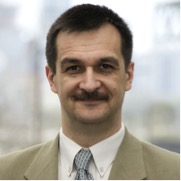About
Endre Takacs is physicist whose interests are in the generation, characterization, and use of radiation for fundamental research and applied science. His Atomic and Medical Physics Group develops instrumentation, experimental, and modeling tools for precision spectroscopy and advanced radiosurgery. Endre received his PhD at the University of Debrecen, Hungary in 1992 in the field of collisional atomic physics. He earned a Soros Scholarship to Oxford University in England where he studied slow atomic collisions by photo-dissociation of diatomic molecules. As a post-doc at the National Institute of Standards and Technology (NIST) in Gaithersburg, MD, he helped to install an electron beam ion trap that was the second of such facilities in the world at that time. Between 1995 and 2013, he was a faculty member at the Department of Physics of the University of Debrecen in Hungary and concurrently held guest researcher positions at NIST, including three years as a joint MIT-NIST research scientist. His experiments spanned from high precision x-ray spectroscopy of few electron heavy ions testing the limits of quantum electrodynamics, through measuring the lifetimes of metastable energy levels in highly charged ions, to the interaction of ions with condensed media. From 2006, he led the medical physics group at the rotating gamma-knife facility of the Rotating Gamma Institute in Hungary. He worked with neurosurgeons to use gamma-ray radiation for the radiosurgery of the brain. The interaction of high-energy radiation with biological tissues for diagnostic and treatment purposes is his continued interest to pursue at Clemson.
Visit Dr. Takacs' Department Profile.
How their research is transforming health care
The aim of Endre’s medical physics research program is to investigate and develop advance radiosurgery techniques and to further the understanding of how radiation interacts with biological matter. Stereotactic radiosurgery (SRS) is a form of external beam radiation that combines multiple finely collimated radiation beams and stereotaxy (3D target localization). The multiple radiation beams intersect to deliver a single, precise, high dose of radiation to a precisely defined location, while minimizing radiation exposure to surrounding tissues. Current exiting SRS technologies are based on three types of radiation sources: particle beam accelerators, electron acceleration generated photon beams, and Co-60 radioisotope based gamma beam systems. In realizing the ultimate goal of maximizing dose concentration within the treated volume and minimizing radiation to surrounding normal tissue, his aim is to investigate different treatment head designs, beam configurations, and irradiation procedures, both experimentally and using modeling techniques. Studies have shown that chemical and biological processes resulting from radiation interactions affect biological tissue in significant ways. The accumulated dose of radiation in cells can be calculated with Monte Carlo simulation software that was initially developed for particle physics applications at CERN. With the use of the modeling package called GEANT4, his group models the energy and spatial distribution of the primary radiation and secondary cascade processes. In collaboration between the Department of Physics and Astronomy and the Department of Bioengineering at Clemson University, Endre compares this data to experimental results and correlate cellular effects with the received dose.
Health Research Expertise Keywords
Faculty Scholar, Medical Physics, Radiation Therapy, Stereotactic Radiosurgery, Gamma-ray Surgery, Radiation Dose Delivery, Monte Carlo Simulation

